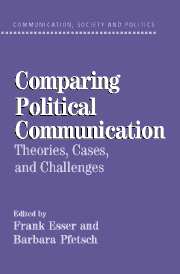Book contents
- Frontmatter
- Contents
- Contributors
- Comparing Political Communication
- INTRODUCTION
- I THEORIES AND METHODS
- II CASES
- 6 Global Political Communication: Good Governance, Human Development, and Mass Communication
- 7 Local Political Communication: Media and Local Publics in the Age of Globalization
- 8 Strategic Political Communication: Mobilizing Public Opinion in “Audience Democracies”
- 9 Political Campaign Communication: Conditional Convergence of Modern Media Elections
- 10 Political Communication and Electronic Democracy: American Exceptionalism or Global Trend?
- 11 Political News Journalists: Partisanship, Professionalism, and Political Roles in Five Countries
- 12 Political Communication Messages: Pictures of Our World on International Television News
- 13 Political Communication Effects: The Impact of Mass Media and Personal Conversations on Voting
- III PERSPECTIVES AND CHALLENGES
- Author Index
- Subject Index
- References
9 - Political Campaign Communication: Conditional Convergence of Modern Media Elections
Published online by Cambridge University Press: 24 November 2009
- Frontmatter
- Contents
- Contributors
- Comparing Political Communication
- INTRODUCTION
- I THEORIES AND METHODS
- II CASES
- 6 Global Political Communication: Good Governance, Human Development, and Mass Communication
- 7 Local Political Communication: Media and Local Publics in the Age of Globalization
- 8 Strategic Political Communication: Mobilizing Public Opinion in “Audience Democracies”
- 9 Political Campaign Communication: Conditional Convergence of Modern Media Elections
- 10 Political Communication and Electronic Democracy: American Exceptionalism or Global Trend?
- 11 Political News Journalists: Partisanship, Professionalism, and Political Roles in Five Countries
- 12 Political Communication Messages: Pictures of Our World on International Television News
- 13 Political Communication Effects: The Impact of Mass Media and Personal Conversations on Voting
- III PERSPECTIVES AND CHALLENGES
- Author Index
- Subject Index
- References
Summary
Though not at all a new phenomenon, Americanization as a “useful hypothesis” (Mancini and Swanson 1996, 4) opened the researchers' eyes for common interests and developments in Western democracies and triggered new research efforts. At the same time it became clear that beside some overarching trends, national characteristics of the political structure, including electoral systems and party structure, as well as characteristics of the media system, have an impact on the way electoral campaigns are designed today. Campaign communication proves to be a field that more than any other has stimulated cross-national research and cooperation. The paper's aim is to take stock of this research and discuss the advantages and difficulties of the comparative perspective on this topic. The overview will show that – not least due to the Americanization hypothesis – the majority of the studies took U.S. campaigns as a point of reference while only a few compared campaigns across Europe, for example, thus revealing a need for further research although research efforts have been intensified during recent years.
Until recently the prime interest of electoral research has always been with voter behavior. When Lazarsfeld, Berelson, and Gaudet (1944) published their classical study The People's Choice, its subtitle How the Voter Makes Up His Mind in an Election already pointed in this direction. At the same time this study, along with its follow-up, Voting, by Berelson, Lazarsfeld, and McPhee (1954) laid the basis for the sociological approach in voter research.
- Type
- Chapter
- Information
- Comparing Political CommunicationTheories, Cases, and Challenges, pp. 213 - 230Publisher: Cambridge University PressPrint publication year: 2004
References
- 14
- Cited by

